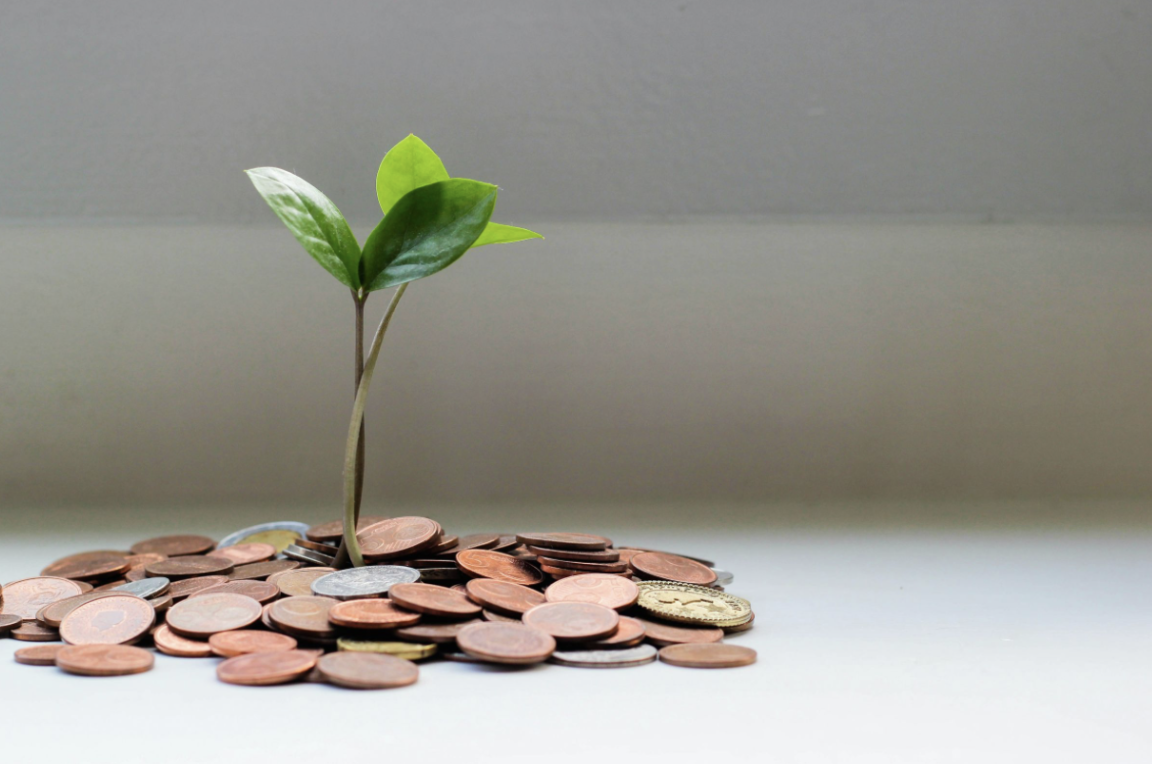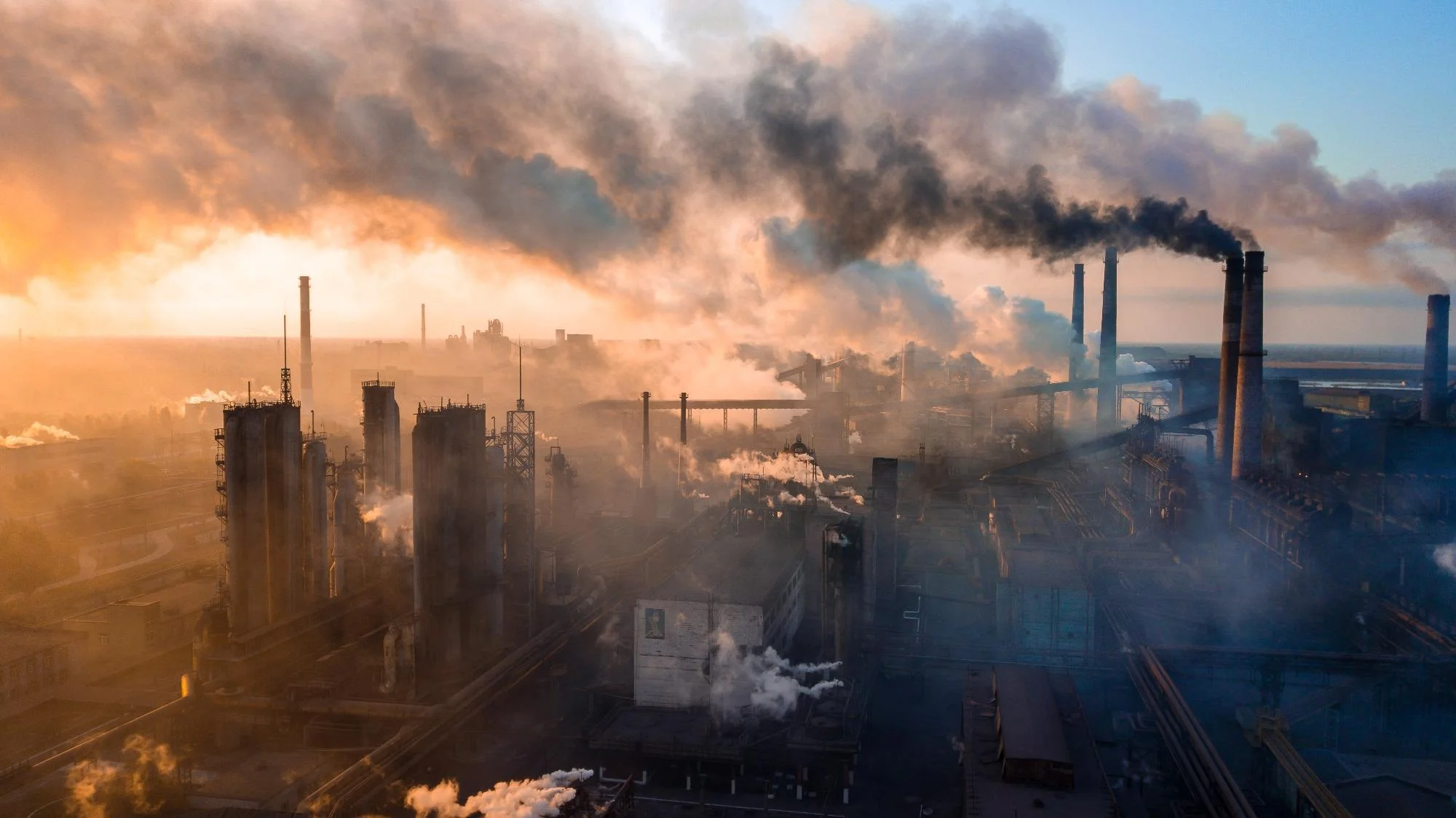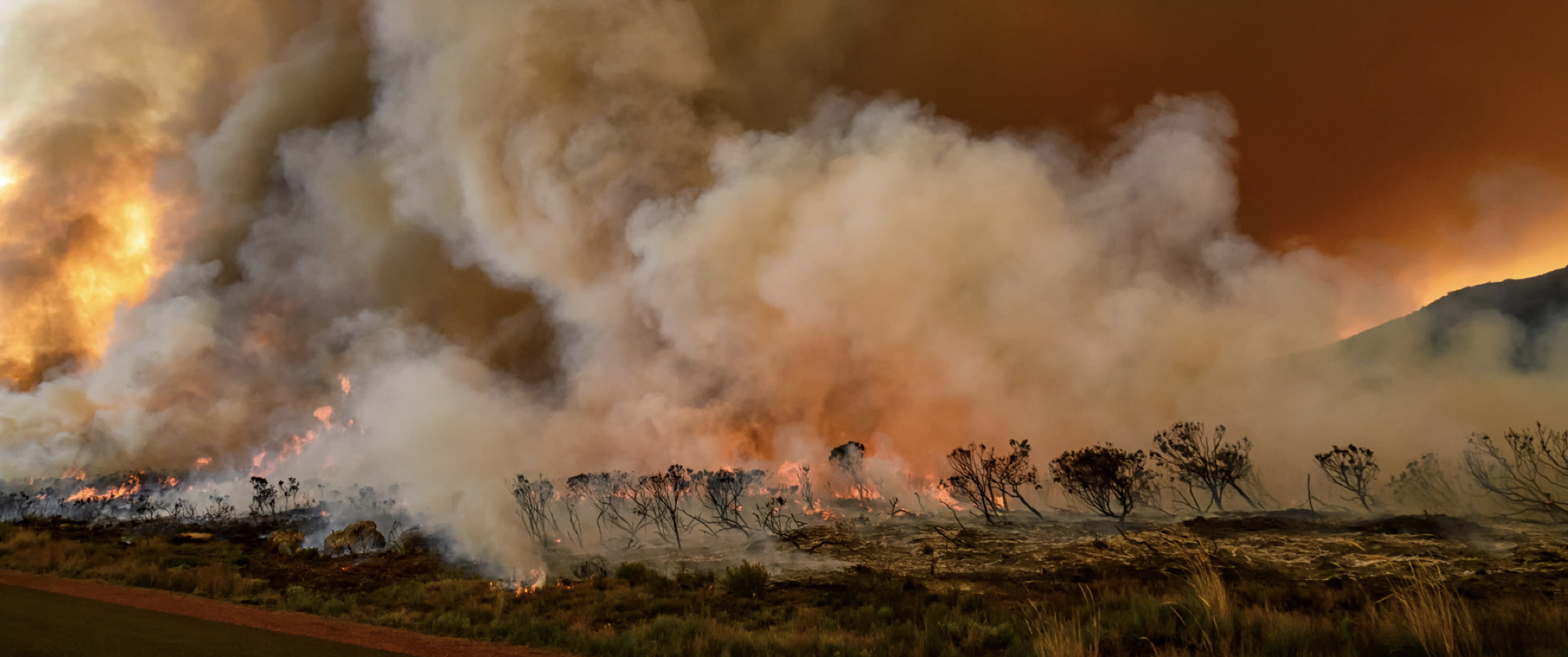The highly anticipated UN Climate Change Conference of the Parties (COP27) was held on 6–20 November in Sharm El Sheikh, Egypt. The “Africa COP” offered an opportunity to address climate injustices in Africa, the continent that is least causing the climate crisis and is the most vulnerable. Unfortunately, the decisions taken at COP27 were not pleasing. The only point counted as a gain was the Loss and Damage Fund, which was accepted to be established to support fragile countries whose economies were severely damaged by the climate crisis.

Developing countries complain that they are most exposed to the environmental impacts of climate change, although they are not responsible for the bulk of the emissions. Africa, for example, accounts for only about 2% to 3% of global greenhouse gas emissions but suffers disproportionately from the results (Africa.com, 2022).
Global warming means the deterioration of ecosystems along with many natural events such as drought, floods, melting glaciers, rising sea levels, and increasing temperature. If the 1.5°C emphases in the Paris Agreement are not realized, many living things’ survival probability will decrease. At the same time, the frequency of disasters and the spread of diseases will increase. By 2030, 108–116 million people in Africa are expected to be at risk of sea level rise, displacing up to 700 million people due to water stress (Africa.com, 2022).
What is Loss and Damage Fund?
In the United Nations (UN) climate talks, “loss and damage” refers to the additional costs and harms caused by climate-related effects such as extreme weather or rising sea levels. The funds envisaged in the text agreed upon at COP27 will cover the financial cost of damages that countries cannot avoid or adapt to (United Nations, 2022).
A report prepared by the 55 countries most affected by climate change points out that the total climate-related losses of these countries in the last two decades are $525 billion. The rich countries, whose greenhouse gas emissions cause change, will pay for this. The EU also argued that China, the world’s second-largest economy but classified as a developing country by the UN, should also pay. But China has not made any payment commitments (Euronews, 2022).
The Executive Action Plan for the Early Warnings for All Initiative
Another critical issue is the campaign to implement an early warning system, especially in Africa, led by the WMO at the request of the UN Secretary-General António Guterres. Only 40 percent of the African population has access to early warning systems to protect themselves against extreme weather and climate change (Africa.com).
At a meeting between government and UN leaders, funding agencies, Big Tech companies, and the private sector, António Guterres said: “People in Africa, South Asia, South, and Central America and those living in small island states are 15 times more likely to die from climate disasters. These disasters displace three times more people than war. And the situation is getting worse.”
The UN agency and its partners prepared the plan, backed by a joint statement signed by 50 countries. The WMO said the need for early warning systems is urgent, as recorded disasters have increased fivefold due to climate change and more extreme weather conditions. However, coverage is worst for developing countries at the forefront of climate change, namely the world’s Least Developed Countries (LDCs) and Small Island Developing States (SIDS) (United Nations, 2022).
Global greenhouse gas emissions are estimated to be 14 percent higher than in 2010 in 2030. To limit global warming to 1.5℃, emissions need to be reduced by 45 percent. We all know that the solution to climate change is to stop using coal, oil, and natural gas almost immediately. In Sharm el-Sheikh, however, India, whose production depended on coal, tried to turn its attention to other fossil fuels. Although this idea was supported by a broad multi-nation coalition, the head of COP27 was not included in the draft text by Egypt. Instead, throughout the meetings, Egypt promoted natural gas, including its production (Anadolu Agency, 2022).
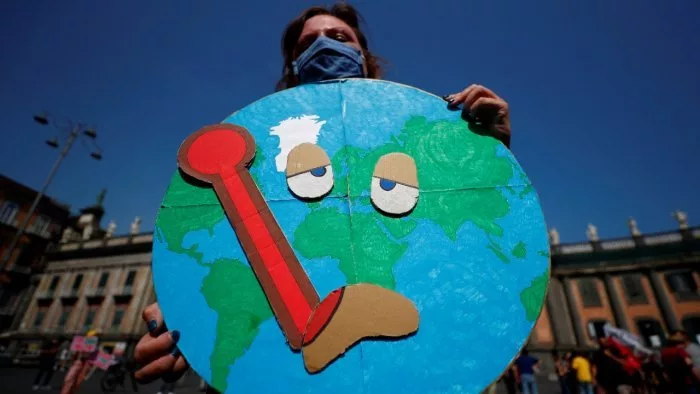
Türkiye’s Climate Target
Türkiye announced its National Statement of Contribution for 2030 at the ongoing COP27 Global Climate Summit in Egypt. According to the statement made by the Minister of Environment, Urbanization and Climate Change, Murat Kurum, Türkiye will continue to increase its greenhouse gas emissions and reduce them from the 41% increase by 2030. Their new target is a 30% increase by 2030 compared to 2020 emissions. By 2030, there will be no emission reductions; a reduction of 500 million tons will be made from the increase in current conditions. Emissions will continue to rise, peaking in 2038. This means the continuation of electricity generation from coal, which destroys the public health of Türkiye and creates a significant burden on the national budget. The announced decision is to plan a steady increase for the benefit of greenhouse gas emissions that cause the climate crisis (Greenpeace, 2022).
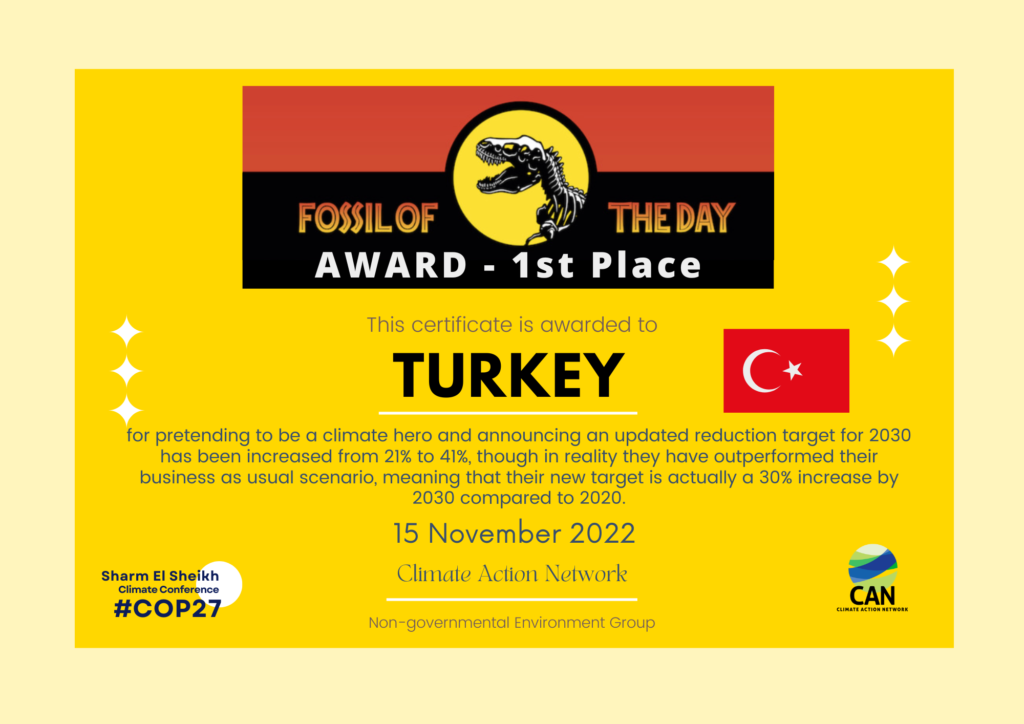
The Climate Action Network (CAN) is a worldwide network of more than 1,100 Non-Governmental Organizations (NGOs) in over 120 countries working to encourage government and individual action to limit human-caused climate change to ecologically sustainable levels. Members of the Climate Action Network (CAN) vote for countries judged to have done their ‘best’ to block progress in negotiations or the implementation of the Paris Agreement. On November 15, Turkey won the Fossil of the Day award, handed out by the Climate Action Network every day at the COP summits (The Climate Action Network International, 2022).
Combating air pollution was not included on the agenda of COP27.
The World Economic Forum, in partnership with the Clean Air Fund, launched the Clean Air Alliance at the COP26 climate change conference in 2021. Clean Air Alliance members pledge to lead change and innovation and measure and set targets to reduce air pollutants across value chains. Since the World Economic Forum and the Clean Air Fund launched the Clean Air Alliance at COP26 in 2021, an influential group of 16 business leaders has decided to measure and reduce air pollutants from their operations and value chains. This group also promotes innovation and encourages its partners to recognize the benefits of tackling air pollution (Clear Air Fund, 2022).
Global companies such as Accenture, Biogen, Bloomberg, EY, GEA Group, Google, GoTo Group, GlaxoSmithKline (GSK), HaleonHalon, AP Møller-Maersk, Mahindra Group, Moderna, Oracle, Siemens, and Wipro are involved in this alliance (Clear Air Fund, 2022).
A series of events and discussions on air quality took place in Sharm El Sheikh. However, the final negotiation text made did not refract air pollution. This is disappointing because air pollution is one of the biggest threats to human health, climate, and the environment. It is the second leading cause of death from noncommunicable diseases after smoking. Seven milSevenion people die every year due to air pollution. The Clean Air Forum says limiting the use of fossil fuels could prevent 3.5–5 million premature deaths from air pollution each year worldwide by 2050 (Clear Air Fund, 2022).
As COP28 studies begin, we hope that national action plans and climate negotiations will focus more on air quality and raise awareness of the impact of air pollution on human health.
References
Africa.com, (2022). https://www.africa.com/climate-change/
Anadolu Agency, (2022). https://www.aa.com.tr/tr/analiz/cop27-yaklasim-farkliliklari-ve-finansman-kaygisi-cozumun-onune-gecti/2744920
Clear Air Fund, (2022). https://www.cleanairfund.org/news-item/cop27-leaders-fall-short-on-health-air-and-fossil-fuels/
Euronews, (2022). https://tr.euronews.com/2022/11/22/cop27-iklim-zirvesinde-tarihi-uzlasi-kayip-ve-zarari-kim-odeyecek
Greenpeace, (2022). https://www.greenpeace.org/turkey/haberler/turkiye-2030-iklim-hedefini-acikladi-komurden-cikis-yok-emisyon-artisina-devam/
The Climate Action Network International, (2022). https://climatenetwork.org/resource/turkey-a-statement-of-confusion/
United Nations, (2022). https://news.un.org/en/story/2022/11/1130277



